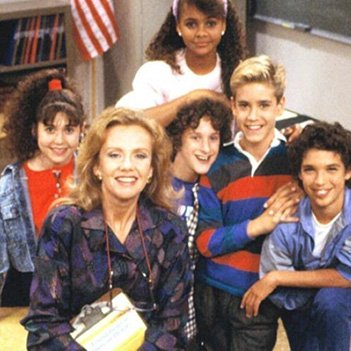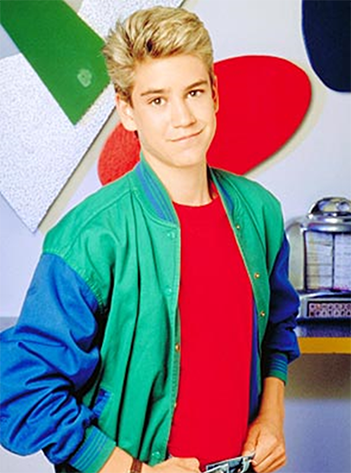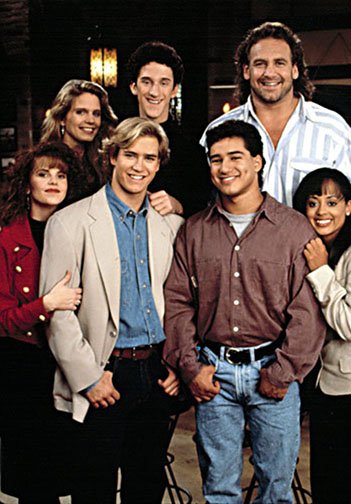Saved By The Bell makes for some uncomfortable truths regarding what society needs versus what it ultimately wants

A couple of weeks ago, Kelly Kapowski, Jessica Spano, Albert-Clifford Slater, Mr. Richard Belding and the 5-dimensional trickster-God known as Zachary Morris were born again on the set of The Tonight Show with Jimmy Fallon. Fans marvelled as the ageless heroes of Bayside High (most of them anyway) seemed to slip back into their roles as though nothing had changed. When Zack appeared on that stage as gracefully as he did a quarter-century ago, there was a 25-second applause (I counted).
“Saved by the Bell” is an impenetrable, gushing fountain of nostalgia and anyone who grew up in the 1990s is likely to be able to flash back to entire episodes (said flashback accompanied by a “magic wand” sound effect and a hot-pink outline). But the genesis of the series makes for some uncomfortable truths regarding what society needs versus what it ultimately wants.

The first appearance of Zack, his looney but lovable sidekick Screech and fashionista/token minority Lisa Turtle didn’t actually take place in the halls of Bayside High, California at all – it was actually in J.F.K. Middleschool in rural Indiana on a very different series headlined not by the student characters, but by the teachers. “Good Morning Miss Bliss” was a bland, bleak and ultimately forgettable 13-episode Disney Channel series about the trials and tribulations of long-suffering teacher Carrie Bliss (played by original Parent Trap twin Hayley Mills) as she tries to instil a sense of morality in a class of youths “brought up on a diet of MTV and videogames”. Each one of the 13 episodes I’ve seen is rife with hardship and tragedy – Bliss’ husband died years ago and Zack is a child of divorce. Before he became the fun-loving prini-Pal of Bayside, Richard Belding was a bewildered bureaucrat who doles out punishments and pardons simply to protect the school’s finances and not bother the school board.
Unlike the fantasy world of Bayside, in ‘Bliss’ actions have severe consequences – after Zack re-invests the money from a class project into potatoes, he lands Miss Bliss in thousands of dollars of debt. In another episode, he lies to a girl about his age and she dumps him and promptly vacates the series never to be heard from again. The series seemed to be designed as a collection of cautionary tales, or ‘after-school specials’, to warn children about the cruel world ahead of them.
Even the banners on the walls didn’t pop with hot pink or generate hype for the Big Dance on Friday night or the Big Game against Valley High School this Saturday, instead it warned children to take “One Step at a Time while walking on the stairs” and that “Students should not slam lockers closed when class is in session”. It’s not hard to see why it didn’t capture the attention of kids at the time. Kids don’t want to be spoken down to or reminded of the crushing mediocrity of real life. They want to step into a fantasy-world.

If the bleakness of “Good Morning, Miss Bliss” was all too realistic, it’s not hard to see why “Saved by the Bell” was bursting with pure fantasy and fun. Instead of placing the focus on a struggling widower, we instead see the world through the omnipotent eyes of Zack Morris – once a fledgling yuppie-kind, now the coolest person in the world, so much so that he could talk to the audience and stop time to suit his needs. Unlike the fascistic grey hallways of JFK middleschool, Bayside High School (which is the exact same set, re-arranged) is alive and buzzing with colour and adventure – in the first episode a surfer dude is seen whizzing through the halls on a skateboard as Zack slides down the bannister, practically mocking the totalitarianism of his previous surroundings. No longer the child of divorce (his rarely-seen father is now a hotshot investment banker married to his doting mother who doesn’t seem to care that much that he keeps getting sent to the Principal’s office), Zack surrounds himself with the focused personifications of high-school archetypes – Kelly, the beautiful cheerleader, beaming with joy and innocence, Jessie, the antagonistic social crusader who just wants to be appreciated, A.C Slater, the macho jock full of tough-guy defiance to Zack’s schemes, Lisa the fashionista and Screech the hyper-intelligent dork with the only pure soul in the group. Unlike the gritty realism of Indiana, Bayside is a vibrant dream world where anything can happen – in addition to Zack talking to the audience in every episode, there’s another occasion where he implants subliminal messages in a George Michael tape so that he can control people’s thoughts, there’s an episode where Screech can read minds and on a number of occasions Screech’s pet robot Kevin, a walking, talking self-aware automaton cracks wise at the situations the gang find themselves in. Disguises are frequently used, elaborate dream sequences take place (including one entire episode where Zack fantasised that he and the gang got a hit record deal), Zack and Slater date and objectify legions of women (only occasionally emerging better for the experience) and despite the most earnest and lovable of attempts to show her affection, Lisa always treats Screech like the shit between her shoes.
Still, the show still retained some of the hapless “Knowing is half the battle!!” attitude of the previous incarnation, but in the cartoon surroundings, they became laughable. Some of the most-remembered episodes of the series are among the most preachy. Jessie’s bout with caffeine-pill ‘addiction’ and Kelly’s run-in with weed in the adorably titled “No Hope with Dope” episode. They’re memorable because of how cheerfully crap they are.
But what made the show a hit in our youth was how exciting it was to dream of the world it represented. Nobody watched “Saved by the Bell” in their actual teen years – no, it was a show for people that were tantalisingly on the cusp of hallowed Adolescence – for people who wished they were teenagers, the way teenagers wish they could be adults. That promised-land era where you didn’t have the concerns of an adult while also having none of the barriers of a little kid. You could go to the cinema or the shops by yourself, you could hang out in diners and eat French fries all day. Supposedly you could even go out with girls! “Good Morning, Miss Bliss!” and the armada of mopey preteen whinge-fests just like it didn’t promise us anything beyond the misery of Monday to Friday life.

When “Saved by the Bell” finally graduated to college, it made the questionable choice of stepping backwards towards social consciousness again. Gone were the robots and the mind-reading, in their place were musings on anthropology and more finger-wagging at the perils of mild drug-abuse (although this time it was nitrous oxide, more valid than ‘caffeine pills’ at least). Don’t get me wrong – it actually was reasonably entertaining and a stylistically appropriate follow-up to the madness of high school, but the move to primetime and the lack of viewer interest in more mature plotlines meant that the ratings just weren’t there. The original gang were bid adieu in a completely insane TV movie entitled “Saved by the Bell: Wedding in Las Vegas”. Guess what happens.
The franchise again regressed to the sunnier, zanier lifestyle of Bayside for the nadir of the franchise: “Saved by the Bell: The New Class” wherein Belding and Screech (back, for some reason) resided over a revolving door of faceless impersonators. The zombified revamp series mysteriously managed to stagger on for a miserable seven seasons.
It might sound like I’m being critical of “Saved by the Bell”, but I’m not. I can’t be. In spite of its ham-fisted morality, in spite of Slater’s lecherous misogyny and Zack’s black-hearted capitalism, the show gave us all something to hope for during that miserable, bland period of pre-pubescence. It promised us burgers, babes and Belding however bizarre those dreams seem now. It was a cold, rude awakening to discover that adolescence was almost just as stagnant and forgettable as the period immediately prior, but for those few years we had our dreams, which like our friends, last forever.
For some reason, my friend Conall and I have decided to start a podcast as we attempt to watch and review each and every episode of the entire franchise, starting with the pilot for “Good Morning, Miss Bliss” and finally ending with the last episode of “New Class”. We’re not sure why we’re doing this, or if we’ll even succeed in finishing it. All we know is that it’s something we have to do. You can listen at enslavedbythebellpodcast.libsyn.com.
See you at the Max, you guys.

